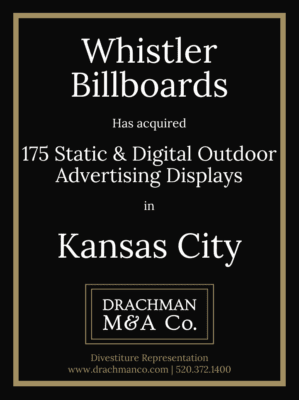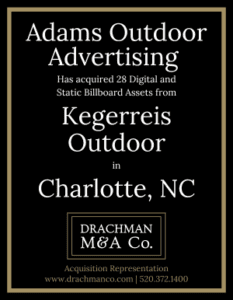
Our firm has been fortunate to represent countless clients that have bought and sold out of home assets from coast to coast, ranging from trades of single permits to the acquisition and sale of entire regional plants. One of the lessons I’ve learned through these deals, which I’ve often shared at IBOUSA conferences, is that one size doesn’t fit all when it comes to outdoor advertising transactions. The size of the deal, the background and relationship of the parties, and the characteristics of the assets all play a part in shaping the structure and terms of the transaction.
And, behind the purchase price, a case can be made that the representations and warranties (most often found in a purchase and sale agreement, or asset purchase agreement) are the most important terms of a deal. Reps and warranties protect the buyer from the unknown—what might not be discovered during due diligence. Many sales involve inventory that has been standing for decades or subject to leases that have rolled over several times. A buyer can do the most exhaustive due diligence—physically inspect the structures, get title insurance, go through contracts and permits with a fine tooth comb—but only the seller has the intimacy with its assets to truly know whether there are “skeletons in the closet” that could make an appearance months or years after closing. A disgruntled lessor may have a grievance over rental payments or a long term automatic renewal. A regulatory entity could be slow to pull the trigger on a permit violation or cancellation. Numerous problems caused by actions transpiring prior to closing can pop up after closing, and from a buyer’s perspective, those issues should be resolved by the party that owned the assets at the time—the seller. The surest way to protect yourself from the unknown when buying OOH assets is a strong set of reps of warranties.
From a seller’s perspective, you want peace of mind that you are truly letting go of a well run or hard earned plant, structure, permit or lease. Sellers don’t want to be looking over their shoulders for months or years to come, concerned that a purchaser may come back to recoup some of the purchase price based on an issue that should’ve been addressed during due diligence. The best scenario for a seller is a well-worded AS-IS clause, but must buyers won’t agree to this type of zero-protection transaction. Full disclosure during due diligence can justify limitations on reps and warranties. A shortened survival period providing for the length in which reps and warranties can be replaced is another benefit to a seller. “To the best of seller’s knowledge” qualifiers may also help a seller avoid liability for the inadvertent failure to disclose relevant information.
One size never fits all with OOH transactions, so it is always a benefit to both buyers and sellers to work with an attorney familiar with OOH mergers and acquisitions, as well as the outdoor industry, when negotiating and finalizing an out of home sale.
To receive a free morning newsletter with each day’s Billboard insider articles email info@billboardinsider.com with the word “Subscribe” in the title. Our newsletter is free and we don’t sell our subscriber list.
Paid Advertisement

















